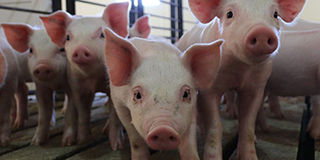Gene-editing creates successful swine fever vaccine

ASF infects all pigs and wild boar and can cause fever, loss of appetite, vomiting and bloody diarrhoea. INTERNET PHOTO.
What you need to know:
- New research yields a vaccine capable of inducing protection against the ASFv Georgia isolate and inducing sterile immunity against the current ASFv strain responsible for recent outbreaks.
Research institutes globally have been involved in a race to develop the first efficacious vaccine for the African Swine Fever (ASFv) that has been decimating China’s pig herd since August 2018.
The virus has also been confirmed in wild boar and domestic pigs across Europe and is currently threatening to move West towards some of Europe’s largest domestic pig populations.
Australia and the US remain on high alert and strict biosecurity measures have been put in place at borders to prevent the introduction of the disease.
Originating in Africa, the highly pathogenic strain of African swine fever virus is believed to have been introduced to domestic pigs and, subsequently, wild boar populations in the port of Poti, Georgia, in 2007 when waste food from a ship originating in South Africa was fed to local pigs.
The disease has since spread in a number of regions globally.
Until the latest epidemic, efforts to stop the disease have been focused on mass culling and implementing strict movement regulation in affected regions, with a failure to produce a successful vaccine.
However, with the catastrophic impact of ASF in Asia in the last 12 months, experts are saying that a vaccine is now the only solution to preventing a similar situation from occurring elsewhere.
The new vaccine
Reports have now emerged of a successful vaccine, developed by researchers from the Agricultural Research Service based at Plum Island, New York, after a new paper was published in the online journal, bioRxiv.
The early results of the trial look promising as all pigs remained essentially free of clinical signs of the disease after being exposed to the complete virus.
Unvaccinated pigs in the groups also remained free of clinical signs, indicating that the vaccine does not increase the risk of other animals contracting the virus through shedding. This new vaccine was developed upon the discovery that deletion of a previously uncharacterised viral gene produces complete attenuation in swine.
The vaccine has been trialled in a clinical environment, with all animals inoculated intramuscularly with the gene-deleted virus remaining clinically normal during the 28-day observational period.
The new vaccine was described in the published paper as “one of the few experimental vaccine candidate virus strains reported to be able to induce protection against the ASFv Georgia isolate, and the first vaccine capable of inducing sterile immunity against the current ASFv strain responsible for recent outbreaks.”
The next step will be to trial the vaccine in larger herds in a commercial farm setting but, for now, this is a positive step in the direction of eliminating pathogenic African swine fever from domestic pig herds. Culling, quarantine and strict biosecurity measures are currently the only defences farmers can use to prevent ASF spread.
The development of a safe and effective vaccine is therefore vital for preventing the transmission of ASF, and is increasingly urgent considering the rapid spread of the disease through Europe and China.
Adapted from: The Pig Site




